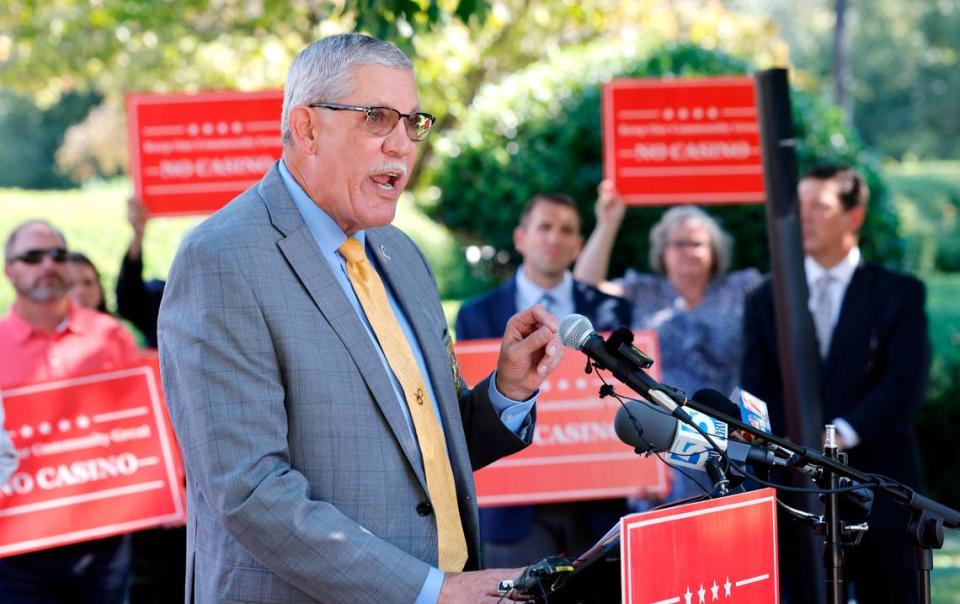During North Carolina’s legislative session, which kicked off in January and ended just last week, a flurry of bills and the two-year budget were passed. New laws include various conservative priorities such as new abortion restrictions, a repeal of the state’s permit requirement for buying handguns and more.
But despite the months-long session dominated by the GOP, who hold a supermajority in both legislative chambers, lawmakers will shortly be back: April 24 is the first day of the 2024 legislative short session. Lawmakers will tackle some of the pending legislation left over from the 2023 long session and make budget adjustments. Here are some proposals that may resurface:
Casino legalization
Whether casinos should be legalized in North Carolina was one of the primary causes of a standoff between the House and Senate over the months-delayed $30 billion state budget, which was supposed to be passed by July 1.
Towards the tail end of the 2023 session, Senate leader Phil Berger set a stake in the ground that casino legalization, as well as the authorization of thousands of video lottery terminals, must be included in the state budget. He said he would not back a standalone bill to legalize casinos. Meanwhile, House Speaker Tim Moore said there were not enough votes in House to back legalization if it was in the budget.

In late September, the House released a new budget version — superseding a prior version approved by them, as well as another Senate budget version — that did not include casinos. Instead, casinos were pushed into a new bill, alongside the gambling terminals and Medicaid expansion. Enactment of Medicaid expansion, passed in an earlier bill, had originally been tied to the passage of the budget. Ultimately, the Senate folded and the budget was passed alongside Medicaid expansion, but without casinos.
Once Berger and Moore announced that they had reached a deal on the budget without casinos, Berger said that lawmakers could consider taking it up again during next year’s short session, as previously reported by The News & Observer. He also said that he believed opponents of the proposal had ignored financial and developmental benefits for rural counties.
Medical marijuana legalization
Medical marijuana legalization is another policy that may show up. During the long session, Senate Bill 3, the “Compassionate Care Act,” which would have allowed medical marijuana use statewide for people with certain health ailments, failed to pass the House, after having passed the Senate in March with bipartisan support. Last year, a similar bill also passed the Senate and died in the House.
This failure came despite the bill being championed by powerful Rules chairman Sen. Bill Rabon, a Brunswick County Republican. Rabon, in late May during a House committee hearing, shared his experience using marijuana illegally while undergoing chemotherapy to treat his colon cancer. He credits the use of this drug as the reason he is alive, as previously reported by The N&O.
Despite getting a hearing in the House, which did not happen last year, and Moore signaling earlier in the year that it may have had a chance, the bill stagnated.
Moore later said that until a proposal is backed by the majority of the Republican caucus, it will not come up to a vote. Another sponsor of the marijuana bill, Democratic Sen. Paul Lowe, told The N&O in late May following Moore’s comments on consensus that he feels “pretty confident we’ll get something done.” He said that he believed the bill would be handled either in the long or short session.
Alcohol law changes
An expansive Senate bill that would have made various changes to the state’s alcoholic beverage control laws failed to get a vote on the House floor after passing through multiple House committees. This bill, which appeared to have support from most lawmakers during the House hearings, was getting traction right around the time the casino debacle began, placing that fight in the foreground.
The bill would have allowed local governments to permit ABC stores to open on Sundays starting at 10 a.m.
On Sundays in North Carolina, you can currently buy beer and wine at private stores, or liquor by the drink at bars and restaurants, but government-owned Alcoholic Beverage Control stores are closed. The ABC omnibus bill would also have allowed permit holders such as restaurants and bars to offer happy-hour drink specials, which are currently prohibited in the state, and to-go and delivery sales of mixed beverages and wine, among other provisions.
What else?
Other bills may also resurface. Bills heard during the long session that passed one of two chambers are eligible to be taken up. This includes bills that failed to pass into law, such as one that seeks to protect North Carolinians from financial ruin due to medical debt and another that would have granted high-level nurses more independence.
